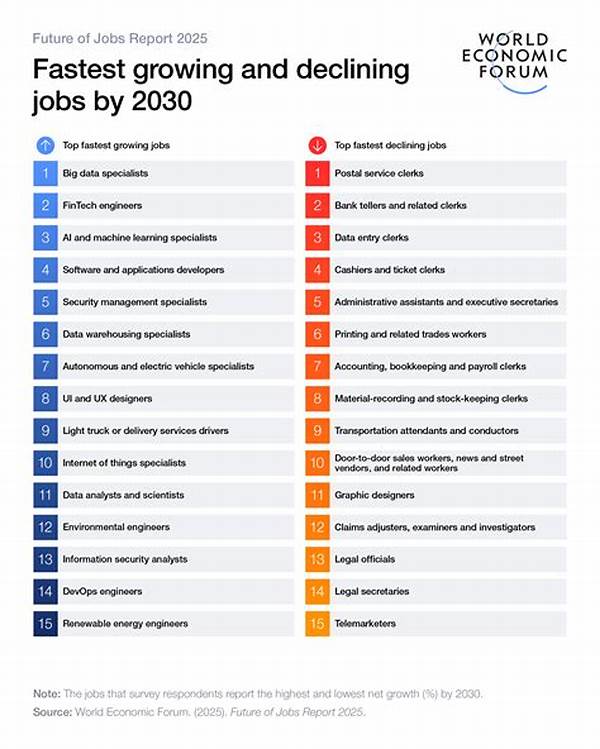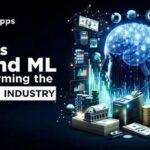As we stand on the cusp of a technological revolution that promises to reshape industries and redefine economies, the profound implications of artificial intelligence (AI) on global job markets in 2025 are becoming increasingly apparent. This is no distant dream; it is an imminent reality staring us in the face. Picture a world where your virtual assistant does not just set reminders but actively manages your portfolio, where self-driving vehicles don’t just transport us but redefine entire employment sectors. The inquiry of how AI impacts global job markets in 2025 is not just academic—it is existential.
Read More : Why Ai Ethics Remains A Hot Topic Globally
Today, businesses are racing to integrate AI into their workflows, buoyed by promises of increased efficiency and cost savings. However, beneath this shiny exterior lie complex challenges and opportunities. AI’s potential to automate routine tasks could lead to extensive job displacement in traditional roles across manufacturing, retail, and even service industries. Yet, it’s not all doom and gloom. New opportunities are sprouting in AI development, maintenance, and oversight. The demand for higher-level cognitive thinking, creativity, and emotional intelligence—which machines struggle to replicate—could also see a renaissance as humans partner with AI.
In this whirlwind of change, educational systems globally are under pressure to adapt, equipping future generations with the skills to thrive in AI-driven employment landscapes. The need for specialized education focusing on AI, data analysis, and other tech-driven fields is gaining momentum. Even those not directly involved with AI creation need to understand its implications to stay relevant in their respective fields.
Interestingly, while AI reshapes traditional employment, it also heralds the rise of new professions. AI ethics officers, data detectives, and human-machine team managers may sound like roles straight out of a sci-fi flick, yet they are becoming crucial components in modern businesses. The question remains, however: how equitable will this transition be? Addressing disparities in AI impact across different socio-economic and educational backgrounds will be key to ensuring a fair and balanced global job market in 2025.
The Dynamics of AI in Redefining Job Roles
When contemplating how AI impacts global job markets in 2025, it is crucial to assess the changing dynamics within industries. As AI seamlessly integrates into various sectors, the roles within these industries are undergoing a profound transformation. Notably, routine manual jobs are becoming prime candidates for automation, prompting a shift towards roles that require more strategic thinking and technological savvy.
Organizations are now scrambling to redefine roles, focusing on upskilling their workforce to align with AI advancements. Employees are encouraged to engage in lifelong learning to remain relevant in a fluctuating market. Furthermore, businesses are poised to capitalize on AI’s analytical prowess, employing its capabilities for predictive analysis, which informs strategic decision-making and creates new career opportunities in AI data interpretation.
Meanwhile, a new ecosystem is emerging for entrepreneurs, driven by AI innovation. There’s a growing marketplace for AI startups and entrepreneurs eager to explore AI’s potential, be it in developing consumer applications or business solutions. As AI becomes ingrained in the fabric of industries, this era will redefine not just economies but also the way employees and employers interact—birthing a collaborative, hybrid workforce where human creativity complements artificial efficiency.
Exploring the Impact of AI on Employment Sectors
As we delve deeper into the question of how AI impacts global job markets in 2025, let’s focus on specific sectors and examples. Consider the healthcare sector, where AI is revolutionizing diagnostics, patient care, and even robotic surgeries. However, as AI shoulders routine tasks, there is a growing demand for medical professionals adept at new technologies, focusing their expertise on complex cases requiring emotional intelligence and human judgment.
The manufacturing sector paints a similar picture, where AI and robotics lead efficient production lines, yet skilled technicians who can interact with these automated systems are now indispensable. AI is also making waves in the financial sector, transforming jobs with algorithmic trading and credit scoring, necessitating roles that manage AI systems and ensure ethical use.
Education, too, is not immune. With AI-driven e-learning platforms gaining prominence, educators are pivoting towards roles that emphasize mentorship and the development of creative thinking. These changes highlight the ongoing requirement for industries to foster adaptability and resilience within their workforce, ensuring they are not just surviving but thriving in an AI-infused world.
Key Considerations for the Future Workforce
Looking ahead, understanding how AI impacts global job markets in 2025 necessitates assessing the broader societal and economic implications. It’s not just about jobs; it’s about livelihood security and quality, shaping universally equitable growth. Governments and corporations need to adopt proactive measures, such as implementing inclusive training programs and designing policies to mitigate job displacement risks, ensuring all demographics benefit from AI advancements.
The rise of AI in global job markets compels policymakers to consider regulations safeguarding employees’ rights while promoting innovation. It also nudges society towards valuing non-automatable skills, paving the way for creativity, emotional intelligence, and critical thinking to shine. By fostering a robust ecosystem where humans and AI coexist, we are set to open new realms of endless possibilities—a shared future defined by collaboration, innovation, and human resilience.
—
By understanding these layers of AI’s impact, we, as a society, can devise actionable strategies to navigate this impending transformation. So, gear up for a future where AI does not just change our work; it enhances our potential, ushers in new opportunities, and heralds a new era of global job dynamics.
—
Discussion Topics on “How AI Impacts Global Job Markets in 2025”
> As we grapple with these questions, it becomes evident that the journey of AI impacting global job markets is both a challenge and an opportunity. By embracing this change and preparing diligently for its diverse effects, society can harness AI to catalyze a brighter, more inclusive future.—
Preparing for AI-Infused Careers
As we enter a world defined by the advent of artificial intelligence, understanding how AI impacts global job markets in 2025 is pivotal for anyone navigating their career path. Whether you’re a recent graduate, a seasoned professional, or an aspiring entrepreneur, getting ahead of the curve means appreciating AI’s potential to reshape job roles and create new opportunities lurking just around the corner.
Adapting Educational Systems
The education sector plays a monumental role in preparing individuals for AI-driven job markets. With the increasing incorporation of AI, curriculums must evolve, emphasizing data literacy, critical thinking, and adaptability. Educational institutions are tasked with the formidable challenge of cultivating a workforce that not only embraces AI technology but thrives alongside it.
Rethinking Workforce Training
Companies globally are confronted with the necessity to upskill their teams. Continuous learning is no longer optional but a requirement. Firms must invest in training programs that enable employees to transition smoothly into AI-centric roles. Empowering workers to acquire new competencies ensures that organizations remain competitive in a rapidly changing landscape.
Fostering Human-AI Collaboration
The synergy between humans and AI will define the future of work. By forging an environment where AI performs routine tasks and humans contribute creativity and empathy, businesses can drive unprecedented growth. Collaborative efforts among AI developers, educators, and policymakers are crucial for sustaining this harmonious coexistence.
Ultimately, the transformation of global job markets due to AI is not a distant phenomenon—it’s already in motion. Embracing these changes with informed strategies and fostering an inclusive transition will pave the way for a prosperous, AI-enriched future.
—
The Recommendations for Embracing the AI Transformation
> By adhering to these recommendations, society can effectively manage the evolving interplay between AI innovation and job transformation, securing a future where both technology and humanity prosper side by side.


